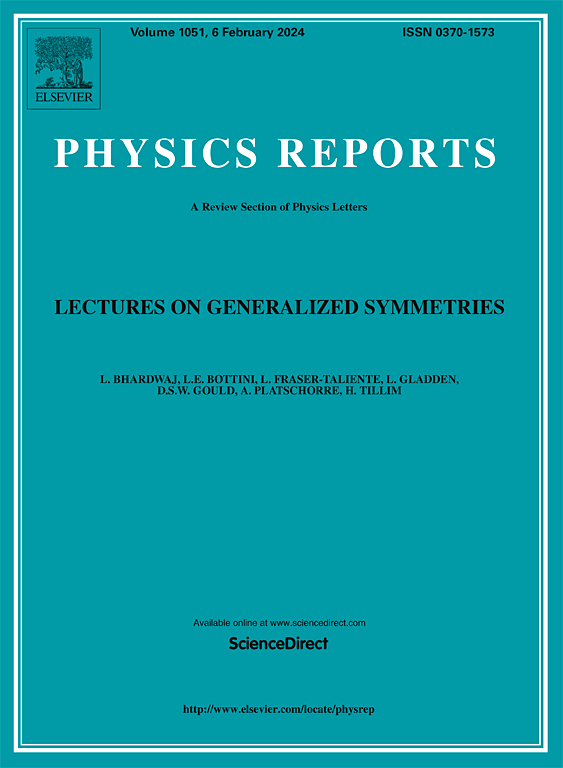宇宙学中的量子纠缠
IF 29.5
1区 物理与天体物理
Q1 PHYSICS, MULTIDISCIPLINARY
引用次数: 0
摘要
我们讨论了宇宙学框架内纠缠研究的最新进展,重点关注动量和位置空间方法,并回顾了直接从量子场提取纠缠的可能性。膨胀时空中纠缠的产生可以追溯到引力粒子产生的现象,根据这种现象,背景引力场可能将能量和动量传递给量子场。相应的纠缠量及其模式依赖性对场统计量和时空展开的细节都很敏感,从而编码了背景信息。引力产生过程在解决宇宙学扰动的量子到经典跃迁方面也起着关键作用。为了直接从量子场中提取纠缠,已经提出了与作为探测器的附加量子系统的局部相互作用,从而形成了纠缠收获协议。尽管从实验的角度来看,收集过程目前是不可行的,但存在各种实施建议,并且通过实际设置解决纠缠提取的探测器和局部相互作用的适当建模至关重要。在工作的最后一部分,我们讨论了位置空间中的纠缠特性,主要关注黑洞时空。我们首先根据面积定律,从离散量子场论中产生的纠缠熵出发,研究了贝肯斯坦-霍金黑洞熵的一种可能解释。然后,我们讨论了用引力细粒度熵公式解决黑洞信息悖论,这为霍金辐射熵的计算提供了一种新的方法,并允许在黑洞蒸发过程中保持一致性。本文章由计算机程序翻译,如有差异,请以英文原文为准。
Quantum entanglement in cosmology
We discuss recent progress in the study of entanglement within cosmological frameworks, focusing on both momentum and position-space approaches and also reviewing the possibility to directly extract entanglement from quantum fields. Entanglement generation in expanding spacetimes can be traced back to the phenomenon of gravitational particle production, according to which the background gravitational field may transfer energy and momentum to quantum fields. The corresponding entanglement amount and its mode dependence are both sensitive to the field statistics and to the details of spacetime expansion, thus encoding information about the background. Gravitational production processes also play a key role in addressing the quantum-to-classical transition of cosmological perturbations. In order to directly extract entanglement from quantum fields, local interactions with additional quantum systems, working as detectors, have been suggested, leading to the formulation of the entanglement harvesting protocol. Despite harvesting procedures are currently unfeasible from an experimental point of view, various proposals for implementation exist and a proper modeling of detectors and local interactions is crucial to address entanglement extraction via realistic setups. In the final part of the work, we address entanglement characterization in position space, primarily focusing on black hole spacetimes. We first investigate a possible interpretation of Bekenstein–Hawking black hole entropy in terms of the entanglement entropy arising in discrete quantum field theories, on account of the area law. Then, we discuss the resolution of the black hole information paradox via the gravitational fine-grained entropy formula, which provides a new way to compute the entropy of Hawking radiation and allows to preserve unitarity in black hole evaporation processes.
求助全文
通过发布文献求助,成功后即可免费获取论文全文。
去求助
来源期刊

Physics Reports
物理-物理:综合
CiteScore
56.10
自引率
0.70%
发文量
102
审稿时长
9.1 weeks
期刊介绍:
Physics Reports keeps the active physicist up-to-date on developments in a wide range of topics by publishing timely reviews which are more extensive than just literature surveys but normally less than a full monograph. Each report deals with one specific subject and is generally published in a separate volume. These reviews are specialist in nature but contain enough introductory material to make the main points intelligible to a non-specialist. The reader will not only be able to distinguish important developments and trends in physics but will also find a sufficient number of references to the original literature.
 求助内容:
求助内容: 应助结果提醒方式:
应助结果提醒方式:


